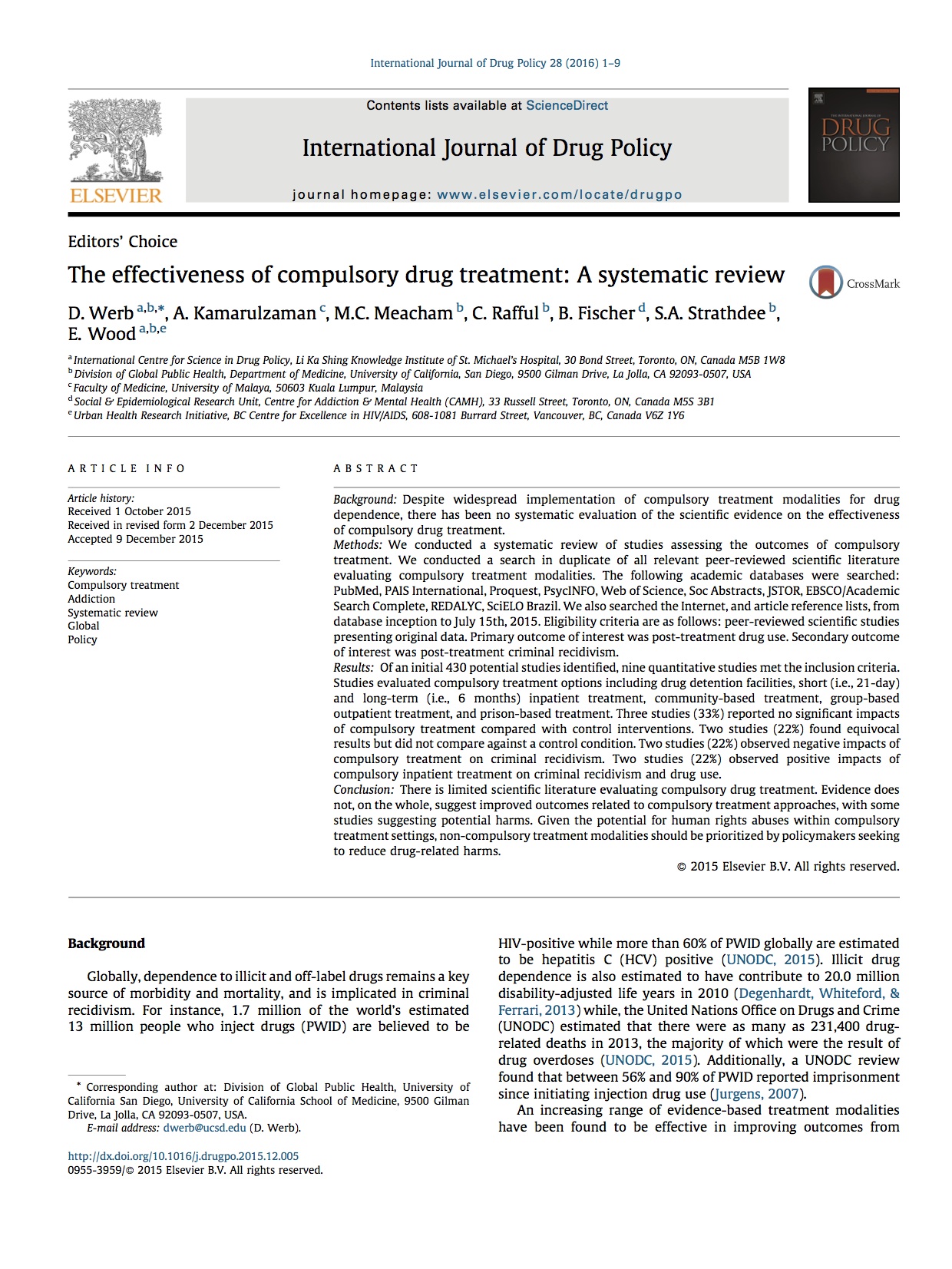Posted: February 9 2016
Author: CDPE
New Study Shows Compulsory Addiction Treatment is Less Effective Than Voluntary Treatments for Long-Term Treatment of Drug Dependence
Toronto, Canada – New research by the International Centre for Science in Drug Policy (ICSDP) finds little evidence that compulsory addiction treatment effectively reduces post-treatment drug use, and arrests or incarceration. Published in the scientific peer-reviewed International Journal of Drug Policy (IJDP), this study is consistent with growing calls from experts to replace the use of compulsory treatment with voluntary, evidence-based, and human rights compliant health and social services to address drug dependence.
“The new research raises serious questions about the increasing reliance on compulsory approaches to drug dependence, particularly in Southeast Asia, Latin America, and Australia ,” said the study’s lead author and Director of the ICSDP, Dr. Dan Werb. “The evidence clearly indicates that forcibly enrolling individuals does not result in sustained, positive outcomes.”
To complete the study, scientists undertook a comprehensive review of existing scientific research to assess the effectiveness of compulsory addiction treatment in the peer-reviewed scientific literature. The study found that:
- Compulsory addiction treatment is less effective than non-compulsory methods at promoting long-term abstention from drug use or reducing criminal recidivism.
- In some cases, compulsory addiction treatment has negative impacts on post-treatment drug use, as well as on arrests or incarcerations, compared to non-compulsory methods.
In light of the lack of evidence suggesting that compulsory addiction treatment is effective, researchers are recommending that policymakers replace compulsory treatment centres with evidence-based approaches to treating drug dependence. For example, a wide variety of evidence-based treatment methods, including opioid substitution therapy and heroin-assisted treatment, have been found effective in reducing post-treatment drug use and criminal recidivism, and should therefore be adopted and brought to scale by national governments in order to reduce the harms of drug use.
Researchers are also pointing to the potential for human rights abuses within these settings as a further rationale to end the use of compulsory treatment immediately. This is in alignment with growing calls from human rights experts, including numerous United Nations agencies, to close compulsory treatment centres.
“The routine use of physical violence, sexual abuse, and forced labour in compulsory treatment centres seriously undermines the human rights of detainees,” explained Mr. Rick Lines, Executive Director of Harm Reduction International. “Until now, some states have maintained that these centres are necessary to address drug dependence. The ICSDP’s new study demonstrates that this claim is unsupported by the scientific evidence, and can no longer be used as a defence for the use of compulsory treatment.”
With the impending United Nations General Assembly Special Session on the World Drug Problem (UNGASS) in April 2016 – the largest international meeting on drug policy since 1998 – an increasing number of governments and international organizations are calling for the adoption of a public health and human rights based approach to illegal drug policy. The study published today suggests that such an approach should prioritize the treatment of drug dependence through voluntary, evidence-based means. Further, the availability of evidence-based treatment should be a key indicator of success when evaluating the effectiveness of drug control policies.
About the International Centre for Science in Drug Policy
The International Centre for Science in Drug Policy (ICSDP) is a network of scientists and academics from all global hemispheres committed to improving the health and safety of communities and individuals affected by illicit drugs by working to inform illicit drug policies with the best available scientific evidence. With the oversight of a Scientific Board made up of leading experts on addictions, HIV, and drug policy, the ICSDP conducts research and public education on best practices in drug policy. This work is undertaken in collaboration with communities, policymakers, law enforcement and other stakeholders to help guide effective and evidence-based policy responses to the many problems posed by illicit drugs.
For more information or to arrange a media interview, please contact:
Nazlee Maghsoudi
Knowledge Translation Manager, ICSDP
nazlee@cdpe.org

